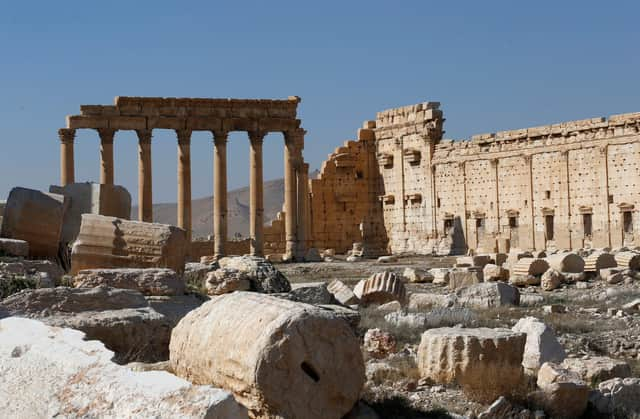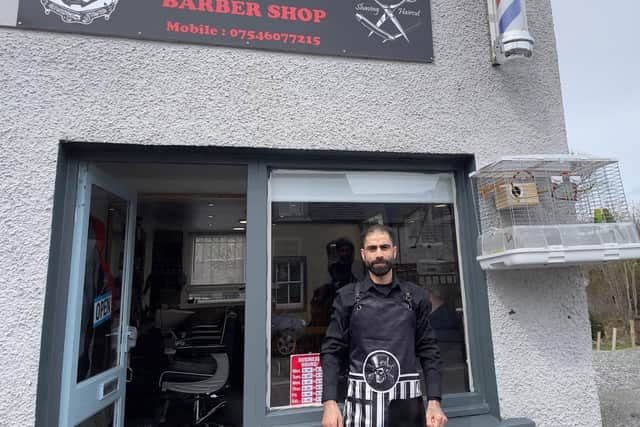To a refugee family, it is peace that counts most


Ousama is only 32 but he has been on quite a journey; from the third city of Syria to a small Scottish town; from welding to barbering; most importantly, from war to peace and an environment in which the family can live quietly, work hard and progress to new horizons.
Their great anxiety is for the prospects of those from whom they are now separated with no prospect of reunion. Such is the lot of the refugee.
Advertisement
Hide AdAdvertisement
Hide AdIn 2011, Homs was a city under siege; the epicenter of a civil war between Syrian Government forces and those who had risen up against the Assad regime.


Within a short space of time, a sophisticated, historic, industrial city became a battle zone full of heavily armed violence, random killings and wholesale destruction. The details of that conflict are incomprehensible to anyone who has not lived within it and knows its nuances.
The whole experience remains too painful for Ousama to talk about. Like many others, he got out. There are now estimated to be 1.5 million Syrians living in neighbouring Lebanon in a population of six million.
Just 150 miles separates Homs from Beirut. That was where the young Alnakeeb family spent the next five years. By turning themselves into refugees, they made it impossible to return legally to their home country until a very different climate prevails. It really was the start of a new life which would lead them to the edge of Europe.
Advertisement
Hide AdAdvertisement
Hide AdIn Homs, Ousama had worked as a welder, mostly fixing windows and doors. In Beirut, he learned to cut granite to earn a living. Beirut, even then, was “a nice city”.
It cannot be described that way now. Ousama has two brothers and a sister living there; also his wife’s sister. It is his deepest desire to be reunited with them as a family, in Stornoway
But how did they end up in Stornoway?
Ousama explains: “When you go to a third country as a refugee, you register with the UNCHR and wait for your turn”. There is not a lot of choosing to be done, with one right of refusal when an offer is made”.
When Ousama’s turn eventually came: “I told the lady at the UNCHR that we would like to go to a quiet place. She told me some information about Stornoway and I said yes”.
Advertisement
Hide AdAdvertisement
Hide AdThe deal was done. This was after Comhairle nan Eilean Siar had agreed to take in seven Syrian families as part of the UK’s response to the refugee crisis which was then facing the whole of Europe.
The Alnakeebs were flown via Turkey and Edinburgh to arrive on the same plane as three other Syrian families, on a wet Stornoway night in February 2017.
The families had not previously known each other so it really was a case of being cast down in a strange place with no friends, no family, no language.
The journey that Ousama and the other Syrian families have made over the past four years is extraordinary and every islander they have come in contact with from the moment of arrival has played a part.
Advertisement
Hide AdAdvertisement
Hide AdJane Morrison, the resettlement support worker for Comhairle nan Eilean Siar, has followed them every step of the way.
She says: “It has been extremely rewarding to see the progress made with all the families, integrating into the local community and employment.
“This has been such a positive experience for everyone working with them.
"The support they have received locally has been wonderful and many wider friendships have been formed.”
Advertisement
Hide AdAdvertisement
Hide AdOusama says that all the other challenges – work, language, contact with those they had left behind – were secondary to “the main concern, which was for our children to grow up in a safe place”.
Children adapt quickly to new environments while for the parents, it is more difficult. He cannot speak highly enough of the people who helped him on that journey – the resettlement team at the council, the employers, neighbours, the tutors at the Learning Shop and Lews Castle College.
They all gave him a chance not only to earn a living but also learn the language. “Everyone helped me a lot and taught me English when they had free time," he said.
Initially he worked at his welding trade, first on placement and then as an employee of two local companies, Angus Clinton and Ivor Murray.
Advertisement
Hide AdAdvertisement
Hide AdMuch as he appreciated the work and support which they provided, he decided on a career change.
“I didn’t like the weather outside,” he says with commendable honesty. “For me, it was freezing!”.
Ousama attended English lessons at the council-run Learning Shop and returned to Lews Castle College to follow a course in hairdressing, part of which was a placement in Men Only, a Stornoway barber’s shop.
He also travelled to Glasgow for a course in hot towel shaving with a view to opening his own business – which has now happened.
Advertisement
Hide AdAdvertisement
Hide AdThe first day after lockdown, March 25th, “Sam’s” opened in Stornoway with Ousama in full barber’s attire. On a fine day, there are two budgies in a cage outside the shop, Syrian style.
The day we meet, it is too cold outside not just for Sam but also for the budgies.
It’s now a case of so far, so good. Business looks promising. Lewis, it seems, is ready for the return of hot towel shaving.
In recent weeks, Ousama’s sons have won fame as Gaelic learners at Stornoway Primary School. First a picture of the eldest, Abdullah, was posted on Facebook by a neighbour with Ousama’s permission.
Advertisement
Hide AdAdvertisement
Hide AdIt drew a huge response, running into tens of thousands of “likes”. Then Comhairle nan Eilean Siar put out a press release with a picture of the three brothers – Abdullah, Majd and Anas - and media interest soared.
How is Abdullah taking to his new found fame as the epitome of a child from a very different background who is proud of learning a new language which belongs to the place in which he has arrived?
“He’s excited,” said Ousama. “He wants to study more”.
Life is good for Ousama and the family in Stornoway but there is a constant source of regret.
Communication with the remaining family in Homs is patchy, depending on how the internet there is working.
Advertisement
Hide AdAdvertisement
Hide Ad“It’s safer,” he says of his native city, “but still not safe”.
Then, most urgently, there are the family members in Beirut who also have refugee status and are caught in the same long wait. Except that conditions are now much, much worse than when Ousama and his family last saw Beirut.
“The situation there is really bad,” he says.
“They are caught between a rock and a hard place. They cannot go back to Syria for fear of prosecution and anyway, the economic situation in Syria is even worse than in Lebanon.
“Things have become very bad in Beirut since the explosion (which last year devastated the port area) and the Syrians are desperate.
Advertisement
Hide AdAdvertisement
Hide Ad"They cannot work and they are not allowed to start a business without legal residency. It’s hard to access health care if you don’t have money and people have to survive on aid given by UNCHR or charities”.
While Abdullah and his little brothers in Stornoway are learning Gaelic and settling smoothly into a new life, their cousins in Beirut – same ages, same potential – are unable to attend school because it costs money their parents do not have.
In a rational world, there would be an obvious solution. In a chaotic one where order struggles to prevail, it is more difficult.
The UK’s Reunification Programme only extends to partners and children, not to siblings and their dependents.
Advertisement
Hide AdAdvertisement
Hide AdIt is not difficult to see why this should be the rule but neither should it be impossible to appreciate why there could be exceptions – a willing host community, cousins cut off from cousins, a proven record of successful integration.
The question is at least worth asking.